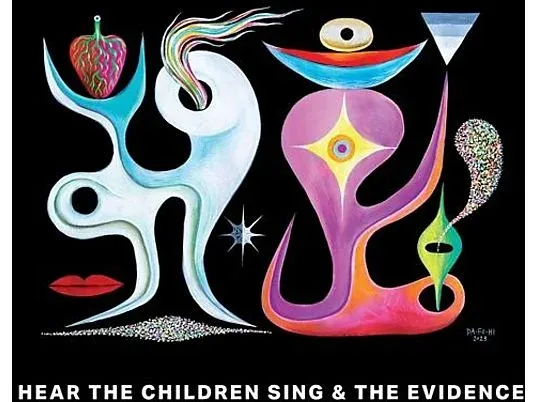Endtime Buddies: Notes on Lungfish and Bonnie Prince Billy, In the Approximate Spirit of One of The Longer Lungfish or Bonnie Prince Billy Songs

Hello all, Today is my birthday and I'm taking full advantage of it by being as wildly self indulgent as I like. So this one is long and has a point that's almost surely about Lungfish and/or Will Oldham but which may not become clear to any of us in this lifetime. In my defense, I did start writing it at 9PM last night. But it's got an invigoratingly free understanding of how semicolons work, some really fine adverb work, and plenty of hyperlinks to great bands. So enjoy (and you were warned). Thanks, Zack


I never wanted to be a music critic. I wanted to be attractive, like Mark Lanegan. Barring the possibility of ever being hot (a possibility I was resigned to before finding the milieus where a country-nebbish with an Elmo-esque body type could thrive), I wanted to be Steve Albini. Eventually I split the difference and tried my damndest to be Nick Cave. When that attempt proved to be a wash, evidenced by the boxes of unsold records stacked in my closet like cold case files, I did become a critic. That maybe should have been the goal all along. It just never occurred to me that being a bummer at parties was something I could invoice.
I’m not bragging but, years before it became physically impossible to keep one’s obnoxious opinions to oneself, I was an early adapter. In this capacity I’ve been hit in the face, at least a couple times, for expressing my opinion about music. While there’s been at least one time in the last decade where I’ve been shoved in a professional capacity, the times I got hit in the face (once with an open hand, once with a boot) happened well, well before I was paid to write. At both times—the first for telling a friend that Will Oldham was just Morrissey for indie boys, and the second for snapping a 311 CD in half at a party—I was mainly paid to wash dishes. In terms of painlessly hurting feelings to the point of provoking violence, I was a hobbyist. Again, I’m not bragging. If I ever “punched up,” it’s only because the other guy was standing and I was mouthing off from a bean bag chair. If I ever “spoke truth to power,” you can be sure that it was because power was standing behind someone harmless who ducked.
Looking now at the 311 and Will Oldham discographies, I may have the order of hits I took to the face reversed. I just know that they both happened in close chronological proximity to each other, in the early-mid ‘90s. I probably don’t need to say which of these encounters I regret more.
I suppose I don’t really regret either of them. 311 remains awful, lacking even the tragic backstory to justify the mass grading-on-a-moral-curve accorded Sublime so that everyone six years my junior can retroactively feel good about blowing $9.99 on their high school bully’s support system in 1996. And, while my snobbery was (and, if that Sublime sentence I had no intention of writing is any indication, still is) needless and unkind, the response (getting kicked in the face and having a boxcutter held to my throat) was outsized enough to make for a halfway decent story (or at least a halfway decent framing device for me reiterating the basic POV twenty years after the fact). As for the Oldham slander, which I didn’t believe at the time and subscribe to even less now, well, I had my reasons. Some of those reasons were rooted in psychology; the insecure and anxious need to lash out, which has pretty much only been tamped down through age and the good loving of a fine, fine lady. Those rooted reasons—ranging from the adolescently universal to the prosaically icky—are none of your business. Which is a pity, as the reasons I’m willing to share don’t make for a sympathetic protagonist, coming as they do from a stupid tic—one I’m still susceptible to—that’s origin is either unknowable or derived from Nirvana becoming popular. Meaning; I liked Will Oldham plenty (“Idle Hands Are the Devil’s Playthings” was mandatory mixtape fodder, usually within spitting distance of Magnetic Fields’ “Strange Powers”) but simultaneously I felt strongly that my friends who liked Oldham (or any of the Palace projects) as much as I did, or even more, liked the music wrong. Worse, how they liked him—using, to my mind, Oldham’s music as a signifier of rural authenticity—was indicative of a deeper rot.
Of course, it was this very (actual) authenticity that threatened me. I don’t fetishize authenticity, but I’ve always thought that being fascinating, like, internally must be glorious. Like everyone in my circle, I drank alcohol for bravery and kisses and I drank robitussin to be terrified and feel insignificant. So I assumed those were the points of art. And all of a sudden these jokers I considered my friends were into knowing stuff. Deep, important stuff, which could only be credibly attained or conveyed by men and women who’d seen some things, gone diving for pearls with Harry Crews, and, at one point during the dust bowl days, had fucked a motorcycle (the memory of which still haunted them, though when they told the story it was darkly hilarious). I thought we’d left that behind with our parents’ Dylan and Dave Van Ronk albums. But apparently oblique wisdom, now drawn from subsisting on southern-gothic, white-on-white violence and fathers who were called “daddy” (usually in the passive tense, as in “my daddy once told me…” with the implication being that their father had gone out for cigarettes when the teller was knee high to a grasshopper and been killed in a war that’s existence square folk were not privy to) was back in vogue. This bothered me to no end. I wasn’t real, so who the fuck were they (my friends, these Palace brothers) to affect so much being? Taking all this profundity as a personal attack, it seemed like a fair thing to trot out the ol’ tried and true “the thing you like is actually this thing you don’t like, but for people like you (who suck)” argument.
Like I said; it wasn’t the hottest of rationals. As people don’t generally enjoy having the things they like compared to things they don’t like, the result was foreseeable. I got a slap. I nodded in response, getting it. Still, wrong or wronger, I can also still see where I was coming from. People should be less ostentatious in their pleasures, when those pleasures hint at something I find hard to reach.
I’ve never been hit in the face for talking shit about Lungfish, the band who started off as Baltimore’s answer to Supertouch (if Mark Ryan’s NYHC band had broke up after “Searchin’ For The Light”), predicted indie rock’s transition to codified Pixies loud ‘n’ quiet a full year before Nevermind, moved into something like Soulside trying to play Loop songs, became the world’s first ASMR hardcore band, and ended up making albums which used repetition, drone, and chant to such a bracing degree that both the Catholic Church and shoegaze briefly threw in the towel (though, after Lungfish’s final album in 2012, both concerns came back swinging). The reason I have never been hit in the face for talking shit about Lungfish is because I would never talk shit about Lungfish, because I love them.
This may seem inconsistent with everything I’ve written so far. As far as esoteric gnosis gnoes, Lungfish’s Daniel Higgs has long been considered the papa bear kahuna of third eyed frontpeople. Since 1992’s Talking Songs For Walking (the CD contained Necklace of Heads, the band’s 12” from 1990), the singer has cut a distinctly druidic figure in the indie landscape, combining a Tad Doyle impositional bellow with the cryptic sensuality of Michael Stipe, embodying the inevitability of revelation with the same fervor as 16 Horsepower’s David Eugene Edwards, but obsessing over the endtimes a few years earlier, just like the Manicheans (or the Jews, whose orthodox facial hair and golem he physically approximated). As far as Christ-dappled sun deities go, you could do a lot worse. That he managed all this without being insufferable is a minor miracle, and a testament to Higgs’ strange charisma. Beyond that, it’s a testament to the alchemical gold—one part Ron Ashton, one part Robert Quine, ten equal parts deconstructed Sabbath and/or Derwood Andrews’ playing on Empire’s Expensive Sound, a couple dozen Zen koans for taste, and uncountable parts the scent of cherry blossoms in Spring—spun by guitarist Asa Osborne. And it’s proof of just how far a good beat—played to infinity, in the case of Lungfish, by Mitchell Feldstein—can get you.

The reasons why Lungfish didn’t exacerbate my gnostic insecurity number as high as the reasons Will Oldham’s steez often did. At the most grubby level, it always helped that Daniel Higgs was always seemingly so in tune with the constellations that I could dismiss him as a flake when I wasn’t in the mood for new wave woo-woo or the truth. Secondly, at least on the first album (on both “Descender” and “Non Dual Bliss”) Higgs pulls the classic “this chick is, like, an oracle” gambit. A Dylan move to be sure, but one rooted enough in the bard’s horniness for manic pixies that it’s relatable to anyone who’s ever fallen hard for someone smarter than them who rocks a dress ‘n’ jeans combo and a single tattoo of Gaia that was drawn freehand by their ex-boyfriend, a literal porpoise.
Finally, context matters. For whatever reason, Lungfish fans never seemed inclined to make their love of the band’s krautrockin’ swirl a major part of their personalities. Certainly they weren’t averse to seeing some signifying kinship in others who shared their fondness for the band, even before “community” became a fancy way of saying “we have the same hobby.”, But there’s a difference between drawing a fish in the dirt and climbing up on the cross yourself. Also, Lungfish were on Dischord. So they were technically a hardcore band. I don’t care how many “post-”s you throw on your genre designation: if the majority of your audience is wearing band t-shirts, you’re my people and no better.
As a side note: I know that I sometimes write about bands that I love in a way that reads as though I hate them. In this particular case, the tone could be that insecurity (that I supposedly don’t feel about Lungfish) asserting itself. Or maybe I just don’t want to come off like a suck-up. Regardless, to avoid confusion, let me make a few things clear.
- I think ASMR is great. I don’t utilize it myself but I think it’s both neat-o and one of the few valuable aspects of the internet, and also art.
- I love hardcore. I will never use the term as an insult. If I call a band “hardcore” when most people call them “post-hardcore,” it’s because I do use “post-hardcore” as an insult. Often, because the majority of the bands who are accurately placed within the post-hardcore genre are actually sexless & hookless hard rock.
- If I insist that a band is “no better” than me, it’s because I still want to believe in the basic principles of punk. But, rest assured, I usually fail at adhering to punk 101 principles. I do secretly think that great artists are better than me. Not in the sense of our worth as humans, but in some not unessential ways.
- That said, like Daniel Higgs, I believe in some real God and the value of worship. So if it seems like I’m being glib as a way to elide just how much Lungfish moved and moves me on a regular basis, consider the language as a private and public good. In the former, I’m sparing us both some embarrassment and, in the latter, I’m doing my part to tamp down fandom’s inclination towards idolatry.
- I don’t actually know that Daniel Higgs believes in God. He may be one of those Alan Moore “I worship metaphors, baby!” types, which would be fine (but don’t tell Flannery O’Connor). Or he might be on the Nick Cave end of the spectrum, where he likes the idea of faith so much that he gets misty eyed about the East India Company and has a “Jerusalem Or Bust” sticker affixed to the bumper of his tour bus. For the sake of this discussion, let’s just assume that Higgs believes in enough cosmic energy to equal at least three demiurges stacked atop each other in a trenchcoat. i.e. God, or something with equivalent firepower.

Not having done any of the required reading about D.C. hardcore, I can’t claim to have any special insight into Lungfish’s formation, or what made the band so singular (or what they achieved that singularity in spite of). The late ‘80s/early ‘90s was overflowing with artists who’d spent their teen years listening to hardcore and punk but who’d tired of the scene’s machismo and anti-art posturing, while simultaneously being too artsy for grunge, too rugged to go all in on twee, and too self-conscious for either the direct action of Riot Grrrl or the arch subversion of Nation of Ulysses. They almost uniformly favored the counter-gloss production sounds coming out of Chicago, but they all seemed to find the accompanying provocations (whether supplied by Steve Albini or David Yow) a bit exhausting. And while they’d happily share a stage, split 7”, or baggie with North Eastern hipsters, they weren’t interested in appropriating the sub-Bokowski, sub-sub-Thirlwell mean-mugging that NYC was shilling at the time (that, tbc, I adored and still do) via labels like Matador (who were city based) or Amphetamine Reptile (from out of town but with a near monopoly on all thuggish-American, non-hardcore rock made by shorthairs and/or people who wore glasses). In the same vein—and without taking anything away from whatever substance issues these bands may have kept close to their chests—these artists shied away from the overt dissolution reverse-championed by acts like the Replacements or Scrawl. So, with nearly every other indie angle ruled out, there was emerging acts like Rodan, Autoclave, Slint, Unwound, Lync, Drive Like Jehu, etc; tuff shit riff rockers with idiosyncratic song structures and tone poem lyrics which morse-code telegraphed unease with mass culture, the counterculture which birthed them, and all the systemic hassles inherent to waking up in the morning.
(There was also the band Mule, but I haven’t quite diagrammed where they fit in just yet.)
Even among these assiduously individual acts, the shamanistic hard psych of Lungfish stood out. Partially because of their frontman and partially because, unlike nearly all their peers at the time, Lungfish songs didn’t have “parts.” They had part. Like the Earth after it first cooled, or the Melvins. And on top of that part, Daniel Higgs poured his own exhortations, which—as far as I can determine—were concerned with systems and hassles which extended far beyond those endemic to the boho alt coffeeshops of the American Carolinas. And, as far as “waking up in the morning” is concerned, Lungfish’s songs rejected that premise entirely.
Partial to one and narratively intimidated by the other, I couldn’t at the time see how spiritually simpatico Lungfish’s music was to the music made (under whichever name) by Will Oldham. I suppose that, not exactly having internalized Daniel Higgs’ lyrics, I took both acts too much at face value. Not even at face value, really. More like I only saw the bangles and haircuts. And from there decided (if I thought about it all) that there was no way the beard of Odin and the wisps of a Waffle House parking lot loiterer might ever converge. I mean, Lungfish were Bonham fills cut, spliced, and repeated as some lupine guitar distortion was barely kept pretty under threat of whip and chair. I wasn’t sure that Will Oldham even used an amp. Unpilled as I was, I couldn’t see that the two acts were actually far more similar than not; both sourced from the same ancient muck and moving clear eyed and parallel towards the same (if differently sketched out) cosmic destination. Even if I was too shallow to grok the kindred souls, I should have at least noticed the matching flannels.
Now, being middle aged and having a bit more sex, death, and taxes (paid, in an array of currencies, to a shitty rainbow of authorities, both governmental and ecclesiastical) under my belt, it all seems pretty obvious. And not just because, cliche point of conversion as it might be, I got I See A Darkness when it came out and immediately repented my prior misgivings with all the absurd and pedantic vigor of a Dime Square Catholic. Rather, the art shared between the two projects feels naturally intertwined, like a cadicuss or one of those videos of a piglet and a kitten who are best friends and take naps together. If you want to call the shared energy “authenticity,” I’ll begrudgingly grant it as long as we don’t stop there. In an interview (detailed further down), Oldham calls it “integrity,” which is closer (I imagine that Oldham sees Lungfish as working within the same dignified muck as the Mekons, who he also admires greatly). A shared integrity might be it—with the cliches of residing in the “gutters and looking at the stars” always lurking—though the term still feels too earthbound for my needs. But communicating a combination of loamy and the celestial ain’t easy to do without getting precious, so let’s not get bogged down (sorry) in the exact phrase. Let’s avoid hyperbole and just say that Lungfish and Will Oldham have historically made art that’s a lot like Jesus Christ. Generous, unworldly, judgemental, difficult to parse but accessible to those up for a bit of the pneumatic rough and tumble. Not above an occasional lapse into wrath, difficult to imitate but more people should try. Amazing hair and hands. Genuinely inspirational in a world where that’s rarer than rare, niche-ly successful and prone to bleeding. Most importantly; not too good for this world (otherwise all three’d done something else). Well, anyway, I’ve made worse points.
In less floofy terms, neither act is bothered by conventional notions of choruses, instead letting their verses and codas extend at their own pace, giving each line its own weight in meaning (while never making a song feel educational). Both acts give the appearance of using guitars as support for lyrics, up until the moment where the silvery loveliness of the playing seems the point. Both acts, in terms of religious text, ostensibly pull mainly from the New Testament, while often giving the listener the feeling that they consider anything after the Book of Malachi to be a bit of a cope. In a blind taste test, would a reasonable person think that Will Oldham didn’t write the lyrics to “Jonah” (“There's evidence of further proof / It's world war three take to the trees / The ghost will give us room to grow / An extra head to take the bullet / So we may speak in trinity / Champions of sin”)? What is Daniel Higgs worldview if not “if I could fuck a mountain / lord, I would fuck a mountain”?

I’m not claiming that you could play a Lungfish album over a Bonnie Prince Billy album and it would fit snug like Dark Side of the Moon synched to the Wizard of Oz, but I am saying that there’s a kinship there*. And a kinship closer than either artist shares with contemporaries whose claim to sonic similarity might be more intuitive on the surface. Admittedly the applying of this exclusivity works easier with one than the other; I won’t pretend that Will Oldham—working as he does within a less niche tradition than Lungfish—doesn’t have brothers and sisters all over. But, for Lungfish, who else comes as close to their meditative drive? Girls Against Boys, sonically perhaps. But that’s conflating sex with love, which most holy texts frown on. So then who? Anyone shunted into the same genre designation, like Quicksand? Refused? Now you’re just being cruel. No, for Lungfish, it’s Oldham or nothing. They might not be his best friend, but he’s theirs and that’s just the way friendship works sometimes.
Anyway, to those who got there first (and, yeah, I know that’s most people familiar with both artists), I’m happy for you/jealous of you. File the win away and keep it like a secret. To those still unconvinced, we’re all in luck. There’s a new Bonnie Prince Billy album, Hear The Children Sing The Evidence. It’s an LP consisting of two songs (“Hear The Children Sing” and “The Evidence”), both twenty minutes in length. And they're both songs originally recorded by Lungfish.
Chris Richards wrote about the album. The Street Stains fromt-person is apparently on a mission to bring Paris Review level-of-quality writing to the Washington Post, and using that quality/hubris to alternate between going down the Billboard Charts—slandering every other popular artist in the order that he finds them—and writing gorgeous and emotionally resonate novellas about the cultural equivalent of the Slap-a-Ham discography. I obviously support him in this endeavor. You should too. The article is paywalled but, as you presumably canceled your NYT subscription on account of their use of the passive voice in their Israel coverage, that shouldn’t be a problem. (Please don’t cancel your subscription to either this newsletter or CREEM to pay for the Post tho. Richards is a fine writer, but let’s not go crazy.)
At one point in the WaPo interview, guitarist Nathan Salsburg says, “On a Lungfish record, nothing ever really goes over five minutes, but the songs feel so much longer,” which is a very funny thing to say about a band one supposedly enjoys. But Salsburg clearly doesn’t mean it is an insult, and he ain’t wrong. Lungfish songs are typically disrespectful to accepted notions of time and space. Of course, with that said, one could argue that quadrupling the length of such songs is gilding the lily. Which it is. And good for it. I have the original versions of “Hear The Children Sing” and “The Evidence”, which are grand songs. The former is a snare-clattering mini-epic where Daniel Higgs tries to tell you something you need to know, but which you can’t know, not really, because that’s not how revelation works in our lil’ preemptive eternal souls. The latter is another plaintive statement of purpose, this time atop a drumless, repeating (obvs) plucking of electricity which both staves off and embraces the inevitable discordance of feedback. Both original songs are swell examples of Lungfish’s testifying mysticism/commanding strangeness. And now I have them again, still gorgeous—still threatening transcendence and, thank God, not delivering (I like being in this world, listening to music, thanks)—but now longer and differently stirring. They sound like Will Oldham wrote them, and kept writing them. And, holy shit, will you look at that, now they have all this lovely gilding on them! Like a successful film adaptation of a good book, lilies and gilded lilies are two separate pieces of art, neither being necessary (in the utilitarian sense) and both essential (in the new wave woo-woo, also true sense).

*And we haven’t even gotten to the Matt Sweeney collaborations. I cut this from the main text as it’s probably too much a stretch to draw comparisons between Oldham’s work with a guitarist who’s been one the best known (white) champions of West African guitar music in America and Lungfish’s perhaps unintentional similarities to some of the Malian or Nigerien outfits who’ll play extended motifs, in motorik boogie songs, at weddings where the dancing goes on for hours. But if we can agree that the term “world music” is dumb unless it’s expanded to include “The West,” and we can agree that “cosmic country” is a wonderful term (which anyone with a basic knowledge of the history of banjos had best use expansively) which we can also all agree is underused to describe all manners of space truckin, then we’re not reaching so far, really. Instead, we’re acknowledging that musical roots do twist real wild in the earth. (Either way, I feel bad that I couldn't fit Chavez in my earlier reductionist overview of early ‘90s indie rock, so I’m glad I could get Sweeney in here, shoehorned as he might be.)
Thanks for reading. Please share and subscribe, Please subscribe to CREEM! New issue out now and next issue (which I’m very excited about) coming in September. If so inclined, please buy these cover songs that Zohra and I did.

Oh yeah, as I mentioned, it’s my birthday today. If you’d like to do me a solid on my big day, please consider donating a buck or two to either the Nooristan Foundation (the charity that Zohra’s dad founded) or Doctors Without Borders, whose general work in Afghanistan and current work operating under genocidal conditions in Gaza and Sudan (and elsewhere) is invaluable. Thanks!

PS. Boffo new albums by Neutrals, Psychic Graveyard, ShrapKnel, and Perennial all came out in last week. All four are highly recommended.